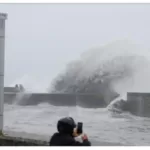La Paz, Bolivia – Bolivia’s President, Luis Arce, finds himself expelled from his own party in the midst of a bitter leadership dispute with the former President, Evo Morales, as both vie for control of the party in preparation for the 2025 election.
In a resolution passed during the Movimiento al Socialismo (Mas) congress on Wednesday, Arce was effectively declared to have “expelled himself” from the party due to his absence from the critical meeting held in the Cochabamba region on Tuesday. Additionally, the Vice-President, David Choquehuanca, and numerous legislators, officials, and activists who aligned with Arce were also expelled from the party. However, the legitimacy of this congress remains in question, and these expulsions could potentially be overturned.
This recent episode serves as the latest installment in the ongoing power struggle between Arce and Morales.
Morales served as Bolivia’s President for nearly 14 years until 2019 when he sought a third consecutive term, contravening the constitution and disregarding a referendum result. Despite winning the election, allegations of fraud from the opposition and mounting protests, along with pressure from the military, compelled Morales to resign and flee the country.
After a year of political upheaval, the Mas party, led by Arce, reclaimed power, with Arce having previously served as Morales’s Finance Minister and hand-picked successor. In a triumphant return, Morales emerged from exile.
Tensions between the two leaders escalated as both indicated their presidential ambitions for the 2025 election. Morales has accused the government of attempting to disqualify him from running in 2025 and has become highly critical of government policies, with his loyal legislators voting against government proposals.
Amidst this increasingly tense atmosphere, both factions have traded allegations of corruption, ties to drug trafficking, and even treason.
This clash reached a climax during the Mas congress convened by Morales, who remains the party’s leader and controls its structure. The congress was held in Lauca Ñ, a town in Morales’s political stronghold, where he had already announced his candidacy for the Mas, bypassing any primary elections.
Many Indigenous and campesino organizations, historically supportive of the Mas, abstained from the congress, questioning its legitimacy. Some have called for a parallel congress in El Alto on October 17th, where Arce will be present. A legal challenge has also been initiated to declare the Mas congress invalid.
The electoral authorities will determine whether the congress’s decisions are ratified or invalidated, and the outcome holds significant symbolic power, as the victor will inherit the legacy of the Mas, a dominant force in Bolivian politics for nearly two decades.







